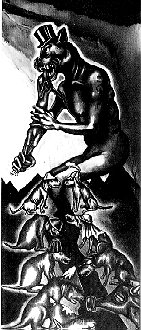

Spring 1997, Web Issue 1
A multidisciplinary
journal in the
arts and politics
FLASHLINKS!
Cover art: copyright 1994-Sue Coe,
"The West Meets the Rest"
Courtesy of Galerie St. Etienne
 Galerie
Galerie
Board of Editors
Jim Angelo
Joe Brennan
Rosalie Gancie
JR Foley (web editor)
Cathy Muse
Carlo Parcelli
Mark Scroggins
Michael Kopacz (webcheese)
-
There is the ubiquitous school of ... "Lawn Mower Poets", the "Simpering Sonneteers" or the "I-I-ME-ME-I-ME Advanced School of Navel Studies." Their only referent is his or her upper-middle class sentimentalized "personal crisis" -- hairline, waistline, on-line, supermarket line, whatever. ... [They] ... are agonizingly self-absorbed and solipsistic. How can people barnacled with such bourgeois excesses speak to injustices or address historical events? ... Can they offer third world nationalist movements anything in the way of counsel other than capitulation? [Their] poems have their solipsistic origins at the poet's window, looking to his/her favorite tree(s), or more appropriately the poem arises from the poet's couch potato, psychoanalytic, etc. Any scrap of history becomes just another referent for their suburban angst. ... The language is gassy and loose, as though the poems were written after a hearty meal. There are few dynamics, few allusions that might indicate a world beyond each poem's enervated mass and tranquilizing cliches. - The Trouble with Mediocrity
All essays, poetry, fiction, and artwork are copyrighted in the names of the authors and artists,
to whom all rights revert.
intro
the piety of terror
mark scroggins deconstructing the demiurge
carlo parcelli lives of the novelists
stephen dixon and raymond federman girl beside him
cris mazza a poem in progress
joe brennan in a bad way
ricardo cortez cruz life/art: a static story for the small screen
ronald sukenick adorno and the name of god
david kaufmann a=r=t m=e=a=n=s
joe brennan the rival tradition
ronald sukenick the trouble with mediocrity
carlo parcelli
Welcome to the frontier where the arts and politics clash.
Sometimes a lively street market, sometimes a no-man's-land. (But a no-man's land is always teeming with voracious life.) This is the zone of disturbances FlashPøint illuminates. You, fellow reader, are not a mere observer. You are one of us
in the struggle -- always political, always a struggle of art in action -- to make language speak the world as we live it, as it lives us -- to make things beautifully mean and defiantly non-mean but be something else entirely. FlashPøint illuminates you with us.
In FlashPøint the art is pour l'art, the politics without manifesto. Art and politics clash, pass in the night, interpenetrate, leave no peace. Beauty is not only difficult, it's downright problematic. Like graffiti on brownstone: blight and beauty, beauty and blight ... but dancing!
With
FlashPøint the editors mean to rally a
community of participators and disturbers of the peace -- who are
not afraid to disturb each other's peace (political, esthetic) as
much as anyone else's. FlashPøint does
not just illuminate: it attacks -- and invites attack.
The fat premier print issue of
FlashPøint appeared in May 1996. This
first release of FlashPøint-on-line
presents work from that first print issue as well as new work.
(And so will the next two releases. Plans for the second print
issue will be announced.) Ronald
Sukenick and Amiri Baraka, in very different
ways, have been violating the arts-politics frontier in dazzling
style since the 1950's. Sukenick recounts the adventures of his
own mission in "The Rival Tradition." Baraka, best known for
poetry, plays, and prose, here speaks out in a new medium of line
and color.
In "A=R=T
M=E=A=N=S" and "The Trouble With
Mediocrity" founding editors Joe Brennan and Carlo Parcelli
fire shots across the bow: Brennan at L=A=N=G=U=A=G=E poetry,
Parcelli at just about all poetry being written today. But poets
first, they also expose to return fire examples of what they are
looking for, Brennan an excerpt from "Poem in Progress," Parcelli
from "Deconstructing the Demiurge." Their notions of the proper
relation of l'art pour l'art and politics are not coy.
Neither is the artwork of Andrea Zemel that complements them.
Two essays explore similar and
wholly different sectors of the arts-politics frontier. Editor
Mark Scroggins brings news of one extreme in "Ian Hamilton Finlay: The Piety of
Terror." David Kauffmann considers a surprising paradox in
the thought of the Marxian Teodor Adorno
of the Frankfurt School.
More narrowly, the fiction in
this release
represents a collision of art and politics along the cash nexus.
Rep. Peter Hoekstra (R.-Mich.) recently excoriated the indirect
investment of taxpayers (i.e., National Endowment for the Arts)
funds (via the Illinois Arts Council) in FC2, the small press
formerly known as The Fiction Collective. Rep. Hoekstra cried,
"Porno!," citing four books in particular, one of them Chick
Lit 2: No Chick Vics, the post-postfeminist anthology
co-edited by Cris Mazza, Jeffrey DeShell, and Elizabeth Sheffield. Cris Mazza is here with an excerpt from her
forthcoming novel, Girl Beside
Him. (Coffee House Press has just issued her latest,
Dog People.) Joining her in a range of styles are three
more FC2 writers, including Ron Sukenick (tossing a word bomb), Ricardo Cortez Cruz
(Straight Outta Compton and Five Days of
Bleeding), and Raymond Federman (Take It or Leave It
and many more), who here joins with Stephen Dixon
(Frog and the new Gould: A Novel in Two Novels
(both Henry Holt)) in casting a wry eye (four of them) on the "Lives of the Novelists."
Join us! Tell us what you think.
- JR Foley